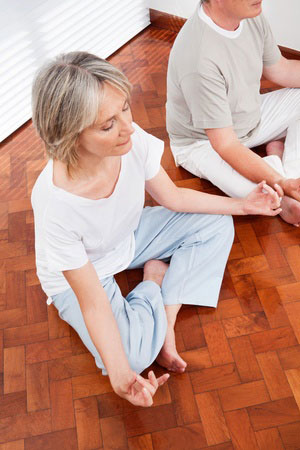 Meditation is often misunderstood. In the minds of some, meditation is simply when you focus your mind intently on one subject. Still others perceive meditation to be when you mentally visualize a tranquil scene (like walking on the beach). Technically speaking, neither of these assumptions are correct. Ideally, true meditation is when your mind is scrubbed clean of thoughts, leaving you simply present in the moment. The empty mind alone is not sufficient, because this is what occurs when someone has a severe brain injury. Someone whose mind is blank but they are not aware in the moment is not in a healthy place.
Meditation is often misunderstood. In the minds of some, meditation is simply when you focus your mind intently on one subject. Still others perceive meditation to be when you mentally visualize a tranquil scene (like walking on the beach). Technically speaking, neither of these assumptions are correct. Ideally, true meditation is when your mind is scrubbed clean of thoughts, leaving you simply present in the moment. The empty mind alone is not sufficient, because this is what occurs when someone has a severe brain injury. Someone whose mind is blank but they are not aware in the moment is not in a healthy place.
On the other hand, meditation is much more than simply zoning out. It is a mental state of what’s known as ‘thoughtless awareness’: the act of being there, but not there so to speak. Thus, another assumption about meditation needs to be addressed: you do not have to be sitting with your legs crossed in a silent room in order to achieve this state of being.
In fact, an experienced practitioner of meditative technique could be in a state of thoughtless awareness while at work in a busy office. Thus, it’s not where you are that matters. Instead, it’s your capacity to clear your mind so that you can achieve such a state.
Here are some benefits of meditation for all ages:
Stress Relief
In today’s fast-paced world of drive thrus and one click shopping, meditation is an excellent way of removing yourself from the stress of life. People of all ages experience stress, so stress relief is a necessity for all walks of life. Seniors may be retired, but this doesn’t mean they don’t suffer from stress. Stress is simply the mental and physical effects of prolonged worry or anxiety, and the elderly have a lot of things to worry about: living on their retirement money, figuring out how to pay medical bills, and much more.
Improved Concentration
For any seniors who are vulnerable to or in the early stages of a chronic motor disease, meditation will help deter the symptoms. For example, if an elderly person has early signs of dementia, carrying out meditation exercises daily will keep their minds in peak condition for as long as possible. Meditation helps the brain to strengthen existing connections and make new ones at the same time, so it’s doubly effective for improving brain activity including concentration and memory.
Meditation and the Activities of Daily Living
 Common difficulties for the elderly around the home include health issues, financial issues, and isolation. As we get older our health naturally declines, retirement results in a fixed income that doesn’t really cater for emergencies and lump sum expenditures, and we may have lost a partner. As a result of these potential circumstances, relatives of seniors must do their utmost to love and support them by trying to improve their quality of life.
Common difficulties for the elderly around the home include health issues, financial issues, and isolation. As we get older our health naturally declines, retirement results in a fixed income that doesn’t really cater for emergencies and lump sum expenditures, and we may have lost a partner. As a result of these potential circumstances, relatives of seniors must do their utmost to love and support them by trying to improve their quality of life.
This can be achieved by first examining the adequacy of their activities of daily living. The activities of daily living are the essential things we need to do in order to function effectively. ADLs include eating, getting dressed, getting around, and using the restroom. These basic tasks are the first things that should be addressed in a senior’s life, before moving on to emotional wellbeing and more complex affairs.
Meditation can help to reassure both the senior in question and their relatives with regards to ADLs. First, because it is a great stress reliever, meditation can eradicate the anxiety an elderly person experiences when they come to the point when they need to ask for help in order to complete everyday tasks.
Second, meditation clears the mind, allowing a senior to perform ADLs with increased focus and concentration.
Finally, meditation improves physical health in many ways by stimulating the neurons in the brain. These neurons are responsible for sending messages to different parts of the body, including nerves, muscles, and even organs. Thus, strengthening these neurons ensures excellent overall health by helping them improve their functionality.
Meditation for All Ages
Meditation is beneficial for all age groups, but it is a particularly excellent form of relaxation for seniors because it is low impact and easy to do. There are other forms of mental exercise which may have the same benefits but aren’t as simple. For example, sudoku helps to develop pathways in the brain, but the senior in your life might not be interested in mathematical puzzles. Meditation is accessible and anyone can do it. You do not need any special skills or equipment, so it’s a perfect choice for any elderly person who wants to improve both their mental and physical health.